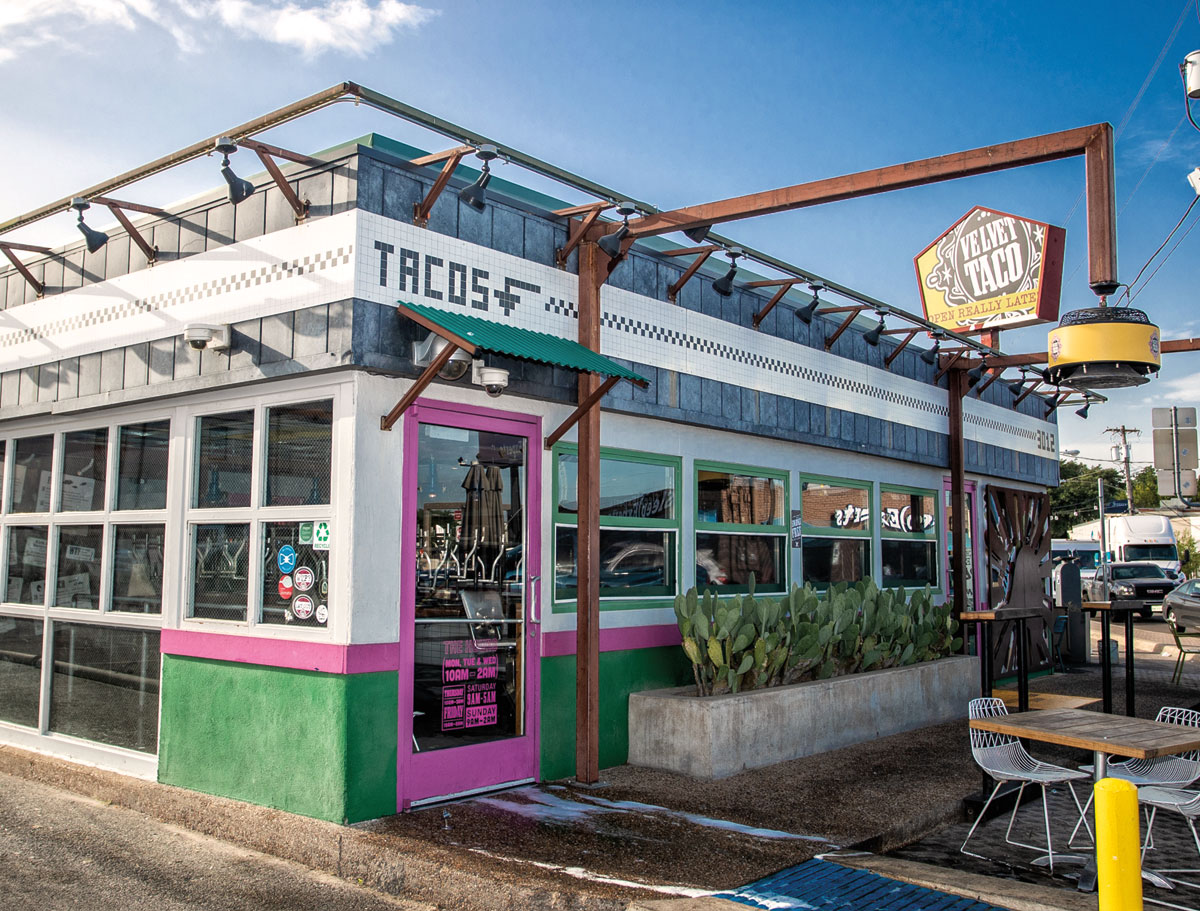Like a yet-undiscovered indie band, there’s undeniable magic in that first restaurant—when it’s all big dreams, bootstrapping, and a tight-knit corps of ride-or-die customers. These days a concept need only whisper of scalability potential before a veritable crush of hungry private-equity funds and growth investors come calling in hopes of getting a piece of the next Shake Shack. But how does a brand take on strategic investment without selling out?
“As you grow as a brand, you risk getting away from what made you special in the early days,” says Clay Dover, president of offbeat Texas taco chain Velvet Taco. “That’s why my favorite compliment we can get is, ‘I didn’t know you guys had another restaurant.’”
Velvet Taco has nine locations nationwide and three more under construction, following a significant strategic growth investment from Greenwich, Connecticut–based private-equity giant L Catterton in 2016. The brand debuted six years ago with a single Dallas taqueria and quickly amassed a cult following with its globally inspired, chef-driven tacos like Spicy Tikka Chicken and Nashville Hot Tofu.
It grew slowly at first, adding a second location in 2014 and third a year after that, with local restaurant group Front Burner Restaurants acting as its sole funder. Dover says it wasn’t until Velvet Taco expanded beyond Texas, with a location in Chicago in 2015, that the team realized it might have something with growth potential.
The brand met with several private equity firms before selecting L Catterton, which has stakes in growing restaurant and retail brands like Hopdoddy Burger Bar, Chopt Creative Salad, and Corepower Yoga. The firm’s global reach and sizeable portfolio were big selling points, Dover says. But beyond the numbers, it felt right. “I remember the first time I met with a senior partner at the Greenwich office, he was wearing jeans, a hoodie, and Vans, and I was like, that’s our brand,” Dover says.
L Catterton connects restaurant leaders in different markets, encouraging brands to collaborate for best practices in everything from implementing software changes to getting specialized ingredients into mainline distribution. Being so ingredient-driven, with 98 recipes for its 19 taco varieties, Velvet Taco has also begun hosting quarterly culinary innovation meetings to develop its quirky recipes on a bigger scale.
“We have to maintain what first made us special, and that requires a partner that makes us comfortable and aligns with our goals,” Dover says. “Everything is great in the dating world; everybody is putting their best foot forward. But then you get married.”
Scaling was always the plan for popular Mediterranean fast-casual chain The Hummus & Pita Co., which CEO Janice Axelrod founded in 2011 with help from sons Dave and Steve Pesso. It came down to timing—specifically, hitting its “proof-of-concept” magic number of four locations, which the New York–based brand did in 2016. Still, Hummus & Pita Co. fielded plenty of offers from prospective investors—one of whom wouldn’t take no for an answer.
“Three or four months after we opened our first location in Chelsea, a gentleman came to us and said ‘Are you interested in franchising?’” says cofounder Dave Pesso, who serves as head of brand and franchise development. “We said, No thanks, we’re good for now. From that day forward, every four or five months he’d come knocking: ‘You guys ready to expand yet?’ That person was Dan Rowe, CEO of Fransmart.”
Rowe came calling again in 2016, this time as half of early-stage investor the Kitchen Fund, which he founded with co-managing partner and longtime restaurant investor Greg Golkin. With a portfolio including by Chloe and Curry Up Now, Kitchen Fund targets leading-edge brands with one or two locations. It’s a risky proposition for those without a deep understanding of restaurant operations, but for Hummus & Pita Co., it was kismet.
“We were on the phone three or four times a day, texting each other at night, sharing ideas,” Pesso says. “They loved and believed in everything we did—just let us be a better us.”
The brand has since shifted to full-on franchising mode, set to open in Holmdel, New Jersey; Denver; Detroit; and Los Angeles by year’s end. Starting next year, the goal is to debut two units a month. Hummus & Pita Co. also brought in a new COO and director of operations, Matt Sheppard, to support its aggressive growth.
Some brands—like Plano, Texas–based Mooyah Burgers, Fries and Shakes—were quite literally born to scale. Founded in 2007 as the middle states’ answer to coastal high-end burger chains In-N-Out and Five Guys, Mooyah has more than 80 restaurants in 20 states and five countries.
In May 2017, it was acquired by an affiliate of lower-middle-market private-equity firm Balmoral Funds and Gala Capital Partners, which focuses on hospitality and food franchises. The transaction grew out of a four-year relationship between Mooyah chief operating officer Michael Mabry and Gala’s president and CEO Anand Gala.
“The transition to private equity wasn’t as difficult as some have experienced since we had a personal relationship and already knew each other’s personalities,” Mabry says. “So we didn’t have to do that beginning-of-a-relationship dance.”
The biggest change of transitioning from co-ownership by founders Rich Hicks and Todd Istre to private equity has been in the reporting mechanisms. Mooyah never had a board of directors until now, and that change has helped the team develop new skills, whether preparing a board presentation or launching a new strategy.
“Bringing in outside capital or selling to private equity is all dependent upon the founders’ and leadership team’s relationship to the brand. You need a lot of communication and transparency,” Mabry says.
Just like any good marriage.

